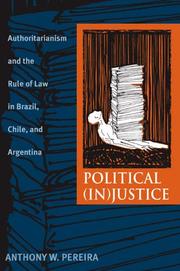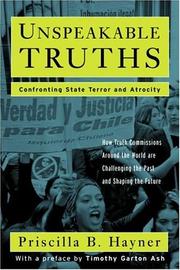| Listing 1 - 7 of 7 |
Sort by
|
Book
ISBN: 5444455129 9785444455128 Year: 2016 Publisher: Moskva : Veče,
Abstract | Keywords | Export | Availability | Bookmark
 Loading...
Loading...Choose an application
- Reference Manager
- EndNote
- RefWorks (Direct export to RefWorks)
Politik. --- Politiker. --- Politische Verfolgung. --- Unterdrückung. --- Stalin, Iosif V., --- Sowjetunion.
Book
Abstract | Keywords | Export | Availability | Bookmark
 Loading...
Loading...Choose an application
- Reference Manager
- EndNote
- RefWorks (Direct export to RefWorks)
Geschichte. --- Politische Verfolgung. --- Revolution --- Revolution. --- Terrorismus --- Terrorismus. --- Sowjetunion.
Book
ISBN: 1408837587 1620403471 9781408837580 9781620403471 Year: 2013 Publisher: New York : Bloomsbury Press,
Abstract | Keywords | Export | Availability | Bookmark
 Loading...
Loading...Choose an application
- Reference Manager
- EndNote
- RefWorks (Direct export to RefWorks)
"'The Chinese Communist party refers to its victory in 1949 as a "liberation." In China the story of liberation and the revolution that followed is not one of peace, liberty, and justice. It is first and foremost a story of calculated terror and systematic violence.' So begins Frank Dikötter's stunning and revelatory chronicle of Mao Zedong's ascension and campaign to transform the Chinese into what the party called New People. Following the defeat of Chiang Kai-shek in 1949, after a bloody civil war, Mao hoisted the red flag over Beijing's Forbidden City, and the world watched as the Communist revolution began to wash away the old order. Due to the secrecy surrounding the country's records, little has been known before now about the eight years that followed, preceding the massive famine and Great Leap Forward. Drawing on hundreds of previously classified documents, secret police reports, unexpurgated versions of leadership speeches, eyewitness accounts of those who survived, and more, The Tragedy of Liberation bears witness to a shocking, largely untold history. Interweaving stories of ordinary citizens with tales of the brutal politics of Mao's court, Frank Dikötter illuminates those who shaped the 'liberation' and the horrific policies they implemented in the name of progress. People of all walks of life were caught up in the tragedy that unfolded, and whether or not they supported the revolution, all of them were asked to write confessions, denounce their friends, and answer queries about their political reliability. One victim of thought reform called it a 'carefully cultivated Auschwitz of the mind.' Told with great narrative sweep, The Tragedy of Liberation is a powerful and important document giving voice at last to the millions who were lost, and casting new light on the foundations of one of the most powerful regimes of the twenty-first century"--
History --- Politik. --- Politische Verfolgung. --- General. --- Mao, Zedong, --- Zhongguo-Gongchandang. --- Civil War (China : 1945-1949). --- 1945-1976. --- China --- China.

ISBN: 0822972832 9780822972839 1306981174 9781306981170 0822958856 9780822958857 0822958856 9780822958857 Year: 2005 Publisher: Pittsburgh, Pa.
Abstract | Keywords | Export | Availability | Bookmark
 Loading...
Loading...Choose an application
- Reference Manager
- EndNote
- RefWorks (Direct export to RefWorks)
"Political (In)Justice compares the legal aspects of political repression in three recent military regimes: Brazil (1964-1985), Chile (1973-1990), and Argentina (1976-1983). By focusing on political trials as a reflection of each regime's overall approach to the law, Anthony Pereira argues that the practice of each regime can be explained by examining the prior relationship between the judiciary and the military."--Jacket
Rule of law --- Authoritarianism --- Political science --- Authority --- Supremacy of law --- Administrative law --- Constitutional law --- 89.36 authoritarian systems (political science). --- Argentina. --- Authoritarian regimes. --- Authoritarianism. --- Autoritarisme --- Brazil. --- Chile. --- Constitutional state. --- Legal systems. --- Politische Verfolgung. --- Recht. --- Rule of law. --- Règle de droit --- Geschichte 1964-1985. --- Geschichte 1973-1990. --- Geschichte 1976-1983. --- Argentinien. --- Brasilien. --- Règle de droit --- Argentinien --- Chile --- Brasilien --- Brazil --- Argentina
Book

ISBN: 3205212169 3205207858 9783205212164 Year: 2021 Publisher: [s.l.] : Böhlau Verlag Wien,
Abstract | Keywords | Export | Availability | Bookmark
 Loading...
Loading...Choose an application
- Reference Manager
- EndNote
- RefWorks (Direct export to RefWorks)
"Europa in Mauthausen" stellt erstmals umfassend die Geschichte der Überlebenden eines nationalsozialistischen Konzentrationslagers dar. Diese beruht auf einer einmaligen Sammlung von über 850 lebensgeschichtlichen Interviews mit Überlebenden aus ganz Europa, Israel, Nord- und Südamerika. Der zweite Band "Deportiert nach Mauthausen" geht der Frage nach, auf welche Weise Häftlinge aus zahlreichen europäischen Ländern in den KZ-Komplex Mauthausen gebracht wurden. Die Deportationen, die Transfers von Häftlingen innerhalb des gesamten NS-Lagersystems und die Todesmärsche führten zu einem ständigen Wandel in der Binnenwelt der Konzentrationslager. Trotz der Allpräsenz des gewaltsamen Todes weichen die Schicksale der KZ-Insassen daher beträchtlich voneinander ab. Die Pluralität der Erfahrungen der Überlebenden und die vielfältigen Analyseansätze der Autoren und Autorinnen dieses Bandes bilden die Grundlage für ein neues, vertieftes Verständnis der "Häftlingsgesellschaft".
History / Holocaust --- History --- Annals --- Auxiliary sciences of history --- Konzentrationslager; Mauthausen; Nationalsozialismus; politische Verfolgung; Holocaust; Besatzungspolitik; Deportation; Europa; Österreich; Oral History; Zweiter Weltkrieg --- ÖFOS 2012, Zeitgeschichte --- concentration camps; Mauthausen; National Socialism, political persecution; Holocaust; occupation policy; deportation; Europe; Austria; Oral History ; World War II --- ÖFOS 2012, Contemporary history

ISBN: 0415924774 0415924782 9780415924771 9780415924788 Year: 2002 Publisher: New York : Routledge ,
Abstract | Keywords | Export | Availability | Bookmark
 Loading...
Loading...Choose an application
- Reference Manager
- EndNote
- RefWorks (Direct export to RefWorks)
Unspeakable truths moves through the murders, disappearances, and tragedies that characterized corrupt regimes like those of Idi Amin or August Pinochet, but Hayner handles these issues with grace and subtlety, using these stories and others to shine a light on the triumphs and shortcomings of past commissions. Unspeakable Truths is a profound, definitive exploration of truth commissions around the world, and the anguish, injustice, and the legacy of hate they are meant to absolve.
International movements --- Human rights --- Criminal law. Criminal procedure --- Political atrocities --- Amnesty --- waarheidscommissies --- 398.1 --- Peace making --- Peacemaking --- Reconciliatory behavior --- Quarreling --- Clemency --- Political rehabilitation --- Political repression --- internationaal publiek recht --- Political persecution --- Reconciliation --- Truth commissions --- #SBIB:023.AANKOOP --- #SBIB:327.5H21 --- #SBIB:340H88 --- Criminal justice, Administration of --- Executive power --- Forgiveness --- Pardon --- Repression, Political --- Persecution --- Civil rights --- Atrocities --- Basic rights --- Civil rights (International law) --- Rights, Human --- Rights of man --- Human security --- Transitional justice --- Commissions, Truth --- Reconciliation commissions --- Governmental investigations --- Vrede – oorlog, oorlogssituaties --- Internationaal recht: rechten van de mens --- Law and legislation --- Amnesty. --- Human rights. --- Political atrocities. --- Political persecution. --- Reconciliation. --- Truth commissions. --- Amnistie. --- Atrocités politiques. --- Droits de l'homme (Droit international). --- Enquêtes publiques. --- Human Rights. --- Menschenrecht. --- Politische Verfolgung. --- Réconciliation. --- Répression politique. --- Terrorisme d'Etat. --- Wahrheitskommission.
Book

ISBN: 3205212177 320520784X 9783205212171 Year: 2021 Publisher: [s.l.] : Böhlau Verlag Wien,
Abstract | Keywords | Export | Availability | Bookmark
 Loading...
Loading...Choose an application
- Reference Manager
- EndNote
- RefWorks (Direct export to RefWorks)
"Europa in Mauthausen" stellt erstmals umfassend die Geschichte der Überlebenden eines nationalsozialistischen Konzentrationslagers dar. Diese beruht auf einer einmaligen Sammlung von über 850 lebensgeschichtlichen Interviews mit Überlebenden aus ganz Europa, Israel, Nord- und Südamerika.Der erste Band präsentiert einen Überblick über das Lager und die Mauthausen-Forschung; er konzentriert sich einleitend auf methodologische Überlegungen und makropolitische Zusammenhänge. Die Beiträge zeigen, dass dem nationalsozialistischen Lagersystem in hohem Maße eine ,Funktion' in den Besatzungs- und Verfolgungspolitiken des NS-Regimes (und der kollaborierenden Länder) zukam.
History / Holocaust --- History --- Annals --- Auxiliary sciences of history --- concentration camps; Mauthausen; National Socialism, political persecution; Holocaust; occupation policy; Europe; Austria; Oral History ; World War II --- ÖFOS 2012, Contemporary history --- Konzentrationslager; Mauthausen; Nationalsozialismus; politische Verfolgung; Holocaust; Besatzungspolitik; Europa; Österreich; Oral History; Zweiter Weltkrieg --- ÖFOS 2012, Zeitgeschichte --- Mauthausen (Concentration camp) --- Germany --- Territorial expansion --- Political aspects. --- KZ Mauthausen --- Mauthausen (Austria : Concentration camp) --- Mauthausen-Gusen (Concentration camp) --- מאוטהאוזן --- Alemania --- Ashkenaz --- BRD --- Bu̇gd Naĭramdakh German Uls --- Bundesrepublik Deutschland --- Deguo --- 德国 --- Deutsches Reich --- Deutschland --- Doitsu --- Doitsu Renpō Kyōwakoku --- Federal Republic of Germany --- Federalʹna Respublika Nimechchyny --- FRN --- Gėrman --- German Uls --- Герман Улс --- Germania --- Germanii︠a︡ --- Germanyah --- Gjermani --- Grossdeutsches Reich --- Jirmānīya --- KhBNGU --- Kholboony Bu̇gd Naĭramdakh German Uls --- Nimechchyna --- Repoblika Federalin'i Alemana --- República de Alemania --- República Federal de Alemania --- Republika Federal Alemmana --- Vācijā --- Veĭmarskai︠a︡ Respublika --- Weimar Republic --- Weimarer Republik --- ХБНГУ --- Германия --- جرمانيا --- ドイツ --- ドイツ連邦共和国 --- ドイツ レンポウ キョウワコク --- Germany (East) --- Germany (Territory under Allied occupation, 1945-1955) --- Germany (Territory under Allied occupation, 1945-1955 : British Zone) --- Germany (Territory under Allied occupation, 1945-1955 : French Zone) --- Germany (Territory under Allied occupation, 1945-1955 : Russian Zone) --- Germany (Territory under Allied occupation, 1945-1955 : U.S. Zone) --- Germany (West) --- Holy Roman Empire
| Listing 1 - 7 of 7 |
Sort by
|

 Search
Search Feedback
Feedback About UniCat
About UniCat  Help
Help News
News